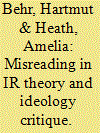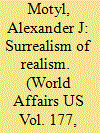| Srl | Item |
| 1 |
ID:
088095


|
|
|
|
|
| Publication |
2009.
|
| Summary/Abstract |
This article is interested in the hegemony which neo-realism accomplished during the second half of the 20th century in both the academic field and policy making of I/international R/relations. Our examination posits the argument that neo-realism can be seen as an ideology rather than a theory of international politics. While this view can connect to individual voices from the 1960s as well as to an emerging body of critical literature since the 1990s, we propose an ideology critique to explore this argument. To unfold this approach we will elaborate some neo-realist misreadings which we think manipulate intellectual history (among others, the writings of Hans J. Morgenthau) and represent an ideological impact intrinsic in the development of IR. An ideology critical approach - which is inherent in Morgenthau's thoughts on international theory themselves and thus helps to reveal profound discrepancies at the heart of an ostensible 'realist'-neo-realist 'unity' - has, firstly, to problematise those discrepancies and, secondly, to focus on hegemonic strategies applied to ideologise and mainstream the academic field. The first part of such an agenda is what we present here; the second part is what we outline methodologically and suggest for further studies in, and of, IR.
|
|
|
|
|
|
|
|
|
|
|
|
|
|
|
|
| 2 |
ID:
141415


|
|
|
|
|
| Summary/Abstract |
Most general readers following events in Ukraine may not be aware that much of the debate and many of the policy prescriptions among “experts” have been dominated by a school of thought in international relations scholarship known as “realism.” In a nutshell, realists have argued that US policy toward the Russo-Ukrainian conflict should be driven by pragmatic American interests and by the realities of Russia’s regional great-power status—two propositions few would disagree with. Realist arguments become more controversial, however, when they go on to insist that Russia’s behavior toward Ukraine is actually a reasonable response to Western attempts to wrest Ukraine from Russia’s sphere of influence and that the culprit behind the ongoing Russo-Ukrainian war is, thus, the West in general and the United States and NATO in particular.
|
|
|
|
|
|
|
|
|
|
|
|
|
|
|
|